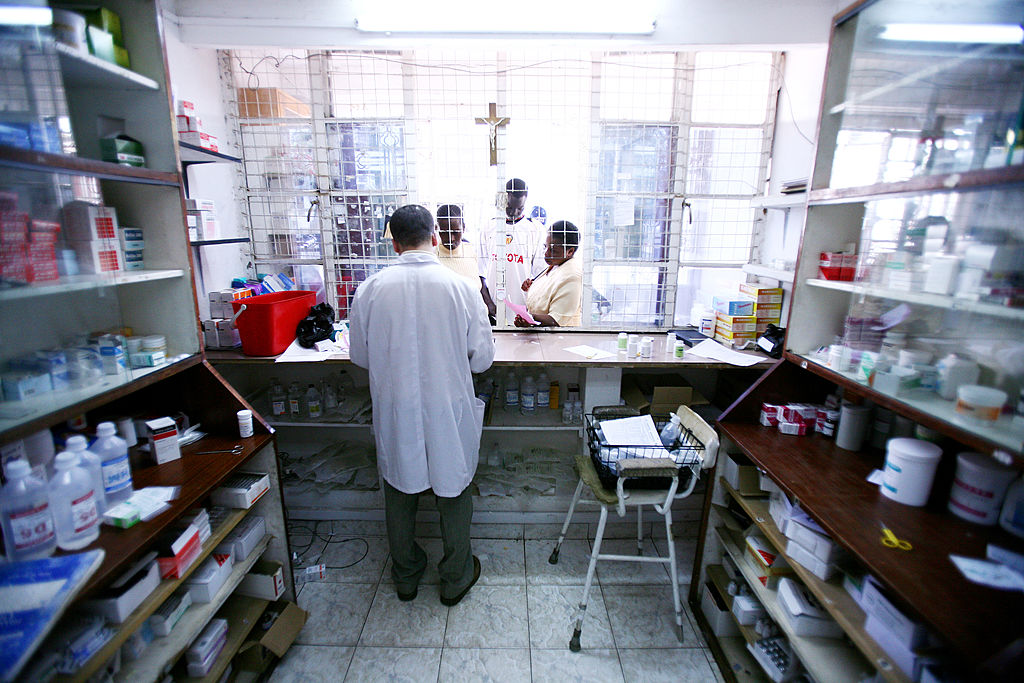Congress narrowly avoided—at least for now—a federal shutdown thanks to a stopgap funding bill approved on Sept. 30. But throughout the whirlwind of activity on Capitol Hill to keep the government running, the deadline passed to reauthorize a vital global health program that’s been credited over the last two decades with saving more than 25 million lives across some 50 countries.
The long-term prospects for the President’s Emergency Plan for AIDS Relief (PEPFAR)—launched in 2003 by President George W. Bush and reauthorized with broad bipartisan support in 2008, 2013, and 2018—are now uncertain. Reauthorization has become mired in a political fight over abortion, as House Republicans seek to stop PEPFAR funding from going to organizations that offer abortion-related services, something the Democratic majority in the Senate strongly opposes.
In the meantime, health experts and administration officials warn that non-reauthorization will erode the program’s ability to purchase affordable care and weaken the U.S.’s role as a leader in global health.
A State Department official tells TIME that the non-reauthorization will not “jeopardize PEPFAR’s operations” during fiscal year 2024, which ends on Sept. 30 next year: “PEPFAR has sufficient funding available to cover most PEPFAR-supported operations, pending timely completion of required Congressional notification procedures.”
But the State Department official adds that the non-reauthorization will “limit PEPFAR’s ability to conduct longer-term procurement of critical commodities, reducing our ability to ensure the lowest possible prices and will hinder our ability to support timely scale-up of new product innovations, all of which would risk the lives of the clients that PEPFAR supports.”
Global health practitioners and advocates also worry that even if PEPFAR is eventually reauthorized, the uncertainty created both by Congress missing the deadline and by the fading of bipartisan support for the program could ultimately increase costs and inefficiencies as well as harm the U.S.’s diplomatic interests.
PEPFAR’s ability to plan over a multi-year timeframe is crucial to the program’s ability to provide support to HIV/AIDS patients across the globe, according to Salim Abdool Karim, a leading epidemiologist and HIV/AIDS researcher at Columbia University.
PEPFAR-supported healthcare providers have previously been able to buy antiretroviral drugs cheaply because they “procure in long term in large quantities in single quantities,” says Abdool Karim. “Now they’re going to have to procure on an annual basis,” which may ultimately lead to less medical treatment for HIV/AIDS patients, he says.
Most PEPFAR contracts are multi-year, “because that’s the way to get efficient, effective life-saving programming,” says Asia Russell, the executive director of the Health Global Access Project. “With that kind of relationship with a contractor or with an academic institution you actually get durable, smart scale-up and accountability.”
Deborah Birx, who led PEPFAR from 2014-2020, says that the historical bipartisan support for PEPFAR was “absolutely critical” in driving policy reforms to fight the AIDS epidemic. “That kind of hard policy discussion is facilitated by a clarity around the world that this is supported by both Republicans and Democrats. Why is that important? Because they know that within that five year period, more than likely there could be a shift in either the Republicans or Democrats on the Hill or in the White House,” says Birx. Without bipartisan support, Birx says more countries may hope to hold out for a change in government rather than implement changes. Birx adds that she’s now “worried about those big policy engagements that the U.S. is really core in negotiating.”
A spokesperson from the National Security Council also stressed PEPFAR’s importance to U.S. foreign relations, particularly with African nations. “This departure from 20 years of strong support could open the door for Russia and China in the Africa region,” says the official. “We remain confident that the supporters of PEPFAR in both parties will find a path forward to get this critical and lifesaving program reauthorized,” the official says.
The path forward, however, is anything but clear. Biden Administration officials have been vocal in pushing for a “clean” reauthorization, citing not only PEPFAR’s work on AIDS but also the program’s role in halting other pandemics, such as Ebola and Marburg Virus from growing out of control.
But this year, House Republican PEPFAR skeptics, led by Rep. Chris Smith of New Jersey, chair of the global health subcommittee that controls the program, have been resolute in opposing such a reauthorization. The opponents allege that part of the program’s nearly $7 billion annual budget goes to abortion providers. “PEPFAR has been reimagined—hijacked—by the Biden Administration to empower pro-abortion international non-governmental organizations,” Smith said in a statement on Sept. 28. (Smith did not respond to a request for comment for this story.)
The Biden administration and global health experts have vehemently denied these charges, noting that federal law already does not permit foreign assistance to fund abortion services. Some PEPFAR grantees, however, do provide abortion-related services with funding from other sources.
For now, the GOP-led House has passed a shorter, one-year reauthorization of the program that adds abortion restrictions to any group receiving PEPFAR funding—something critics say could leave certain parts of the world where there is limited healthcare infrastructure with no partner organizations PEPFAR could support—but this has little chance of passing through the Senate. In any case, talk of PEPFAR reauthorization looks likely to stall while the House remains in a state of paralysis following the ousting of former Speaker Kevin McCarthy.
As the battle lines are currently drawn, it is hard to envision a form of PEPFAR reauthorization that could “get through the House that could also survive the Senate and the White House,” says David P. Fidler, a global health expert at the Council on Foreign Relations. “Anything that might get through the House with a new speaker is not going to get through the Senate. You know, we’re really in uncharted territory here.”

